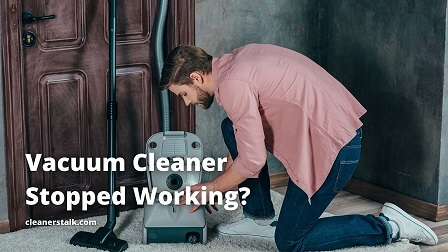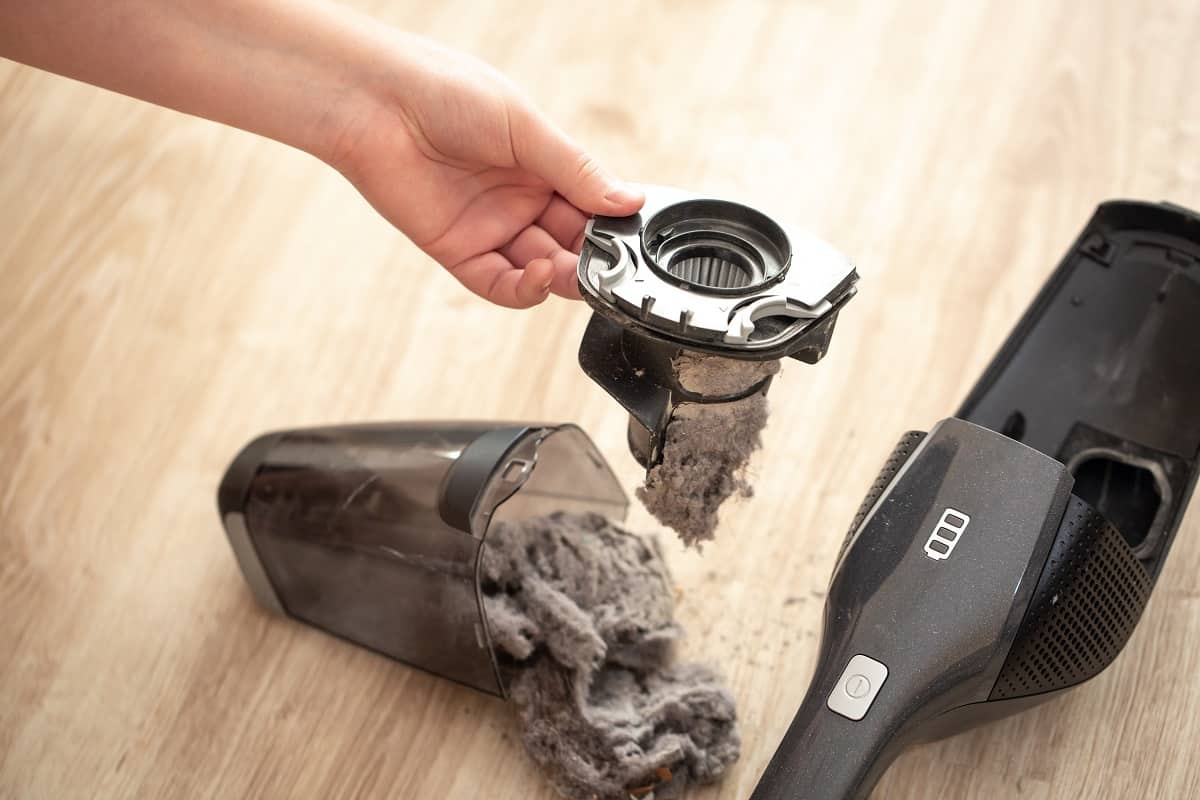
Why Has My Vacuum Cleaner Suddenly Stopped Working?
Cleaners Talk is reader-supported. This post contains affiliate links, we may earn a commission at no additional costs to you. As an Amazon Associate we earn from qualifying purchases.
A vacuum cleaner makes your cleaning work more relaxed and lighter. Considering the work a vacuum cleaner has to do to keep your floors and surfaces clean, it's prone to breaking down occasionally. However, the problem may be simpler than you think, and can easily be fixed if you understand its source.
Why has my vacuum cleaner suddenly stopped working? It may sound simple, but lack of power is often why your vacuum cleaner has stopped working. Check that the vacuum cleaner is properly plugged into a working power outlet, or that the fuses and breakers don’t need resetting.
If your vacuum cleaner suddenly stops working, it could be due to one or more reasons. Most machines are fitted with a protective trigger that prevents the motor from burning out. In this post, we will answer: why has my vacuum cleaner stopped working? Here is the complete vacuum cleaner troubleshooting guide:
Common Vacuum Cleaner Problems:
1. Lack of Power
Has the power gone off without your knowledge? The power status should be the first thing to check if your machine suddenly stops working. Ensure that it’s properly plugged into the socket if a power outage is not the issue. We often find that the biggest culprit to vacuum cleaner problems is simply the lack of power.
Additionally, you may also need to check that the fuses and breakers are in good working condition. It could be that they need resetting for the cleaner to resume operation. Blowing a fuse or tripping a circuit breaker is a relatively common issue, especially if you like to vacuum, as it carries huge electrical load.
2. Activated Thermal Cut-Out
An activated thermal cut-out due to a blockage is the next most likely cause of the problem. Are there blockages in the filters or hose? An obstruction in any part of the vacuum cleaner could be the source of the problem. Always remove the vacuum's plug from the power source before troubleshooting or attempting to remove any obstructions.
Some common areas where blockages happen include the filters, suction head, and the tubes. If you identify the blockage and resolve it, your problem will be solved. Leave the machine to cool off before powering it on again. Check the recommended minimum time, as stated in the user guide.
3. A Full Dust Bin or Bag

A full dust/dirt bag may cause a vacuum cleaner to suddenly stop working.
A full bin or bag will prevent the vacuum cleaner from working as required. The simple remedy to the problem is to empty the bin. Make it a habit to empty into the trash can as often as possible to prevent such problems. Additionally, clearing out the dust bag frequently will prevent any dust from circulating back into an area.
4. Faulty ON/OFF Switch
The ON/OFF switch can become faulty over time and need replacing, especially if the vacuum cleaner is old. If the ON/OFF switch fails to function as it should, your vacuum cleaner might suddenly stop working. It will involuntarily turn the machine off while it should be on, or fail to start when you need it to.
Remember, the controls differ from one model to another, but their replacement process is the same. You can have the replacement done professionally, or you can either do it yourself. If your vacuum cleaner is outdated, consider replacing it and buy a new and improved upright vacuum cleaner altogether.
5. Damaged Cord
Another common issue is that the cord might be broken on the inside, hence preventing power from reaching the motor. Begin by checking if it's properly attached to the machine and there are no cracks on its length. If it has any sign of damage, it's wise to replace it immediately to avoid more damage to the vacuum cleaner.
Other areas to check in the electrical path include the plug and the fuses. Use a multimeter to follow the electrical path to identify any broken links. If there is no reading, check the wiring and the outlet. To help you better visualize this method, check out this simple video on how to fault trace on a vacuum cleaner:
6. Tangled Brush Roller
Have you cleaned the brush roller frequently? If not, the dirty brush roller can be a potential source of problem. A roller that is tangled by strands of hair, pet fur, or carpet fiber, will not spin as it should. This will cause the vacuum to suddenly turn off to prevent the motor from overworking or overheating.
Thankfully, this is an easy fix. Turn off the power and untangle the brush head. Cut through the debris with a pair of scissors and pull it all out. Once the roller and brush are clean, plug in the machine and see if the problem persists. Make it a habit to clean dust, dirt, and debris from the brush roller after several cleaning.
7. Failed Motor
If all else fails to reveal the problem, you probably should check the motor. The first sign that the engine is faulty is the cleaner appearing dead. Motor problems usually arise from blocked filters, obstructed brush rolls, or overused vacuum bags. If the motor is faulty, you need to replace the vacuum cleaner motor.
However, before replacing the motor, check that the underlying problem is fixed. It makes no sense to have a new motor that will break down as soon as it’s fixed. Alternatively, you may also use this as an opportunity to buy a new vacuum cleaner. A new handheld vacuum cleaner, perhaps?
What If My Vacuum Cleaner Won’t Stay On?
If you come across any of the above issues and get them fixed, your machine should go back to working normally. Unfortunately, sometimes it won't stay on for long after plugging. This is another frustrating situation that can dampen our cleaning moods. The probable cause for this is overheating.
Chances are, the machine is getting too hot and automatically turns off to cool itself down. If this happens more than twice, unplug the machine and leave it for a while. Your model-specific user manual indicates how long you should wait. Once it has cooled down, check if any obstructions are preventing it from working.
If the situation persists, the small thermal fuse might require a replacement. Thankfully, you can get it easily from the local vacuum store and replace it yourself or hire an expert.
Final Thoughts
To recap everything we have discussed, check whether there's a blockage in any of the parts obstructing the machine. The electrical path may also be compromised and unable to let power get to the motor. Other issues could be a full dust bin, a clogged brush roll, faulty controls, or spoilt motor.
And there you have it, the complete troubleshooting guide to the question: why has my vacuum cleaner suddenly stopped working? Once you identify the problem and fix it, let the vacuum cleaner cool down before starting it again. If the problem persists, get professional help or replace the unit.
